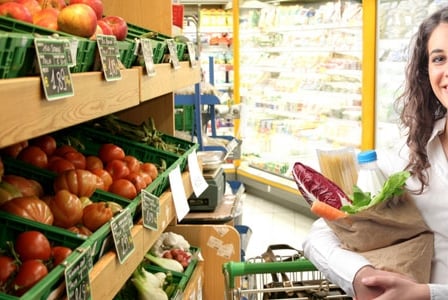
The EWG has released the 2012 Shoppers Guide to Pesticides in Produce, featuring the Clean 15 and Dirty Dozen.
If you’re a regular reader of alive you’ve probably heard about the Environmental Working Group’s (EWG) annual Dirty Dozen and Clean 15. These lists highlight the absolute worst and best produce items in terms of detectable pesticide levels.
For those of us who are concerned about ingesting pesticides, but just don’t have the funds to purchase all organic groceries (pretty much all of us, right?), these lists are a huge help. They indicate which fruits and veggies are best bought organic, and which would be safe enough to cleanse in a non-toxic produce soak and then peel, if necessary.
Would you like chemicals with that?
Government tests carefully reviewed by the EWG revealed that 68 percent of samples (60,700 between 2000 and 2010) tested positive for at least one pesticide.
Further, 11 percent of the samples tested positive for at least five pesticides. These numbers are worrisome, as pesticide exposure has been linked to skin problems, digestive disorders, ADHD, neurological disorders, and developmental effects in utero, as well as disruption of the endocrine and reproductive systems, among other things.
Of course, organic produce is grown without the use of synthetic chemicals or fertilizers, and so by purchasing those heavily toxic items organic we can greatly reduce our pesticide exposure. Here are the worst offenders as far as conventionally grown produce goes.
Dirty Dozen Plus
- apples
- celery
- sweet bell peppers
- peaches
- strawberries
- nectarines (imported)
- grapes
- spinach
- lettuce
- cucumbers
- blueberries (domestic)
- potatoes
In addition, the following items have been added on, as they “may contain pesticide residues of special concern.”
- green beans
- kale/greens
Fortunately, the results weren’t all bad, and the following items were found to have the lowest levels of pesticides.
Clean 15
- onions
- sweet corn*
- pineapples
- avocado
- cabbage
- sweet peas
- asparagus
- mangoes
- eggplant
- kiwi
- cantaloupe (domestic)
- sweet potatoes
- grapefruit
- watermelon
- mushrooms
*Keep in mind that some sweet corn sold for human consumption is grown from genetically modified seeds. Choose organic sweet corn if this is a concern.
Print this list out and keep it with you when you shop. Choosing the right produce will save you money in the long run, as well as your health.
To read more about the EWG’s Dirty Dozen Plus and Clean 15, visit their website. And for information on cleansing your grocery cart beyond the produce aisle, read our recent article “Cleanse Your Grocery Cart.”

